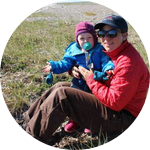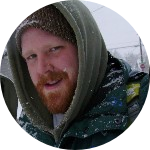About This Project
For my master's thesis, I will conduct a mix of community archaeology and ethnographic survey/interviews which will address the question, "what is gained by doing community science?", specifically in archaeology. In addition to informing the development of public-professional relationships in future public archaeology projects, this project's findings will also help define the relevance of archaeology (and in some ways, science in general) to the public at various scales.
Ask the Scientists
Join The DiscussionWhat is the context of this research?
In the last two decades, many archaeologists have started to bring the public to archaeology through interpretive or interactive archaeological projects and programs. While many of these projects are widely viewed as successful, no rigorous assessment has been made of how well they actually worked or what the experience meant to anyone involved, and none of these projects follow any sort of standard guideline. Furthermore, sciences like archaeology can have substantial relevance to the lives of practically everyone - be it learning more about the place you are from or your ancestors, or discovering new techniques to battle hunger, natural disasters, or climate change. Therefore, archaeologists could do more to be aware of how to best bring archaeology to the community and vice versa.
What is the significance of this project?
This project is unique because it uses anthropological methods and theory to test, measure, and assess the impacts and outcomes of doing community archaeology. The project will provide data on public perceptions of, and feelings towards, science and archaeology that could be readily integrated into a broad range of educational, scientific, and curatorial efforts. While the results of the archaeological portion of the project will address an important issue to local archaeology (the efficacy of different surface survey methods in different terrain types), the anthropological portion will provide information about both archaeologists' and lay persons' expectations and experiences working on a community science project. This information will be extremely valuable for guiding future projects.
What are the goals of the project?
The archaeological portion of the project involves a mix of archaeologists and members of the public working several days in the field to address the research question about surface survey methods. The ethnographic portion of the project seeks to assess what people gain from doing archaeology and involves interviews of everyone involved in archaeological fieldwork. Additional interviews of archaeologists not involved in fieldwork, as well as a baseline survey of Portland area adults (target N=200-300) will provide a variety of background data that will be used to further understand the results from the interviews conducted with the participants in the archaeological fieldwork. Through analysis and triangulation, meaningful patterns and themes will become apparent.
Budget
The portion of my work that requires funding is the ethnographic survey of Portland, Oregon area adults (target N=300). This brief, anonymous survey explores the public's understanding of and feelings towards the past, science, and archaeology. This type of information is extremely valuable to archaeologists, historians, and other people working to present the past to the public who owns it!
I will offer $5 to respondents who complete this face-to-face survey. With $500 of funding, I could offer to compensate 100 people (one third of my target N), which could result in interesting comparisons between the responses of participants who were compensated vs. those who were not compensated.
Moreover, compensating respondents will not only increase response rate, but also likely decrease sample bias (by broadening the range of respondents willing to take the time to participate).
Endorsed by
Meet the Team
Martin Plumer
I am a master's student in Anthropology with over 8 years of experience in professional archaeology, including many projects with local communities. My archaeological experience includes working in 13 different states in the US (most recently in Oregon), as well as Tanzania, East Africa. The most rewarding work I have done has probably been working with Navajo communities on Navajo Nation land in New Mexico and Arizona.
I believe that history and the past are powerful things, and that as humans we have a right to have a say in our own heritage - no one person owns the past, we all do! With this belief, I have made community engagement a focus of my work and career goals as an archaeologist and anthropologist. Specifically, I am interested in using ethnography - or cultural anthropology - to further understand what different people think should be done with archaeological sites and other historic areas.
As scientists, I think it is our duty to use rigorous methods and theory to understand people's thoughts and feelings (instead of just assuming we know what people want out of us, or haphazardly conducting interviews with no outlined methods), because otherwise we abandon the scientific method which we were all educated to follow. I believe this philosophy & approach could be applied to many different kinds of science, but I chose to use my experience working with the public and doing archaeology to address this issue in my own field!
Additional Information
Anyone interested in volunteering for the community archaeology portion of the project can find more information here!
Project Backers
- 11Backers
- 102%Funded
- $510Total Donations
- $46.36Average Donation

